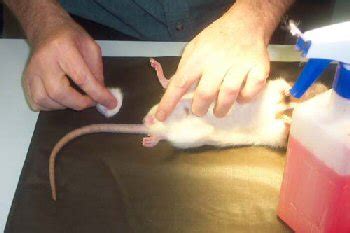Understanding Rat Neutering Procedures and Associated Costs
Rat neutering, also known as castration, is a surgical procedure that removes a male rat's testicles. While not always medically necessary, it offers several significant benefits, making it a common choice for many rat owners. This comprehensive guide delves into the procedure itself, the associated costs, and factors influencing those costs.
What is Involved in Rat Neutering?
Rat neutering is a relatively straightforward procedure performed by a veterinarian experienced in small animal surgery. The procedure typically involves:
- Anesthesia: The rat is first given a general anesthetic to ensure comfort and prevent pain during the surgery. The type of anesthetic used will depend on the rat's health and the vet's preference.
- Incision: A small incision is made in the scrotum.
- Testicle Removal: The testicles are carefully removed.
- Wound Closure: The incision is closed with sutures (stitches) or surgical staples. These often dissolve on their own, eliminating the need for removal.
- Post-operative Care: The rat will require post-operative care, which includes pain management and monitoring for any signs of complications. This usually involves a recovery period at home with careful observation.
What are the Benefits of Neutering My Rat?
Neutering your male rat offers several advantages:
- Reduced Aggression: Unneutered male rats can exhibit increased aggression, particularly towards other males. Neutering significantly reduces this aggressive behavior, leading to a more harmonious multi-rat household.
- Prevents Unwanted Breeding: This is crucial if you don't intend to breed your rats. Unintended pregnancies can quickly lead to overcrowding and potential health issues within your colony.
- Reduces Scent Marking: Male rats are notorious for scent marking their territory through urine spraying. Neutering significantly reduces this behavior.
- May Reduce Certain Health Risks: Some studies suggest that neutering may slightly reduce the risk of certain tumors later in life, though more research is needed in this area.
How Much Does Rat Neutering Cost?
The cost of rat neutering can vary widely depending on several factors:
- Veterinarian's Fees: Veterinarians set their own prices, and specialized exotic animal vets often charge more than general practitioners. Location also plays a role—costs in urban areas are typically higher.
- Anesthesia: The type of anesthetic used will impact the overall cost.
- Post-operative Care: This includes pain medication and any necessary follow-up appointments.
- Pre-operative Examinations: Some vets will require a pre-operative health check to assess the rat's fitness for surgery.
Expect to pay anywhere from $100 to $300 or more for the entire process. It's essential to contact your chosen vet for an accurate quote before scheduling the procedure. Always get a detailed breakdown of costs to avoid unexpected bills.
What to Expect After the Procedure
Post-operative care is crucial for a successful recovery. Your vet will provide specific instructions, but generally, you should expect:
- Pain Management: Your vet will likely prescribe pain relief medication.
- Monitoring: Carefully observe your rat for any signs of infection, such as swelling, redness, discharge, or lethargy.
- Quiet Recovery: Provide a clean, quiet, and comfortable environment for your rat to recover.
- Follow-up Appointment: A follow-up appointment may be necessary to ensure proper healing.
How Can I Find a Veterinarian Experienced with Rats?
Finding a vet experienced with rats is crucial for a safe and successful neutering procedure. Start by contacting your local animal shelters or rescue organizations, as they often have recommendations for exotic animal vets. You can also search online for "exotic animal vets near me" or "rat vets near me." Always check reviews and ask potential vets about their experience with rat neutering specifically.
What if I Can't Afford Neutering?
The cost of veterinary care can be a significant barrier for some rat owners. If you're struggling to afford neutering, explore options such as:
- Payment Plans: Many veterinary clinics offer payment plans to help spread the cost of care.
- Local Animal Shelters/Rescues: Some shelters and rescues offer low-cost or subsidized veterinary services.
- Crowdfunding: Online platforms allow you to seek financial assistance from the community.
Remember that preventative measures, like neutering, often save money in the long run by avoiding more expensive health issues later on. Careful planning and responsible pet ownership are key.
This information is for educational purposes only and should not be considered a substitute for professional veterinary advice. Always consult with a veterinarian before making any decisions regarding your rat's health.

